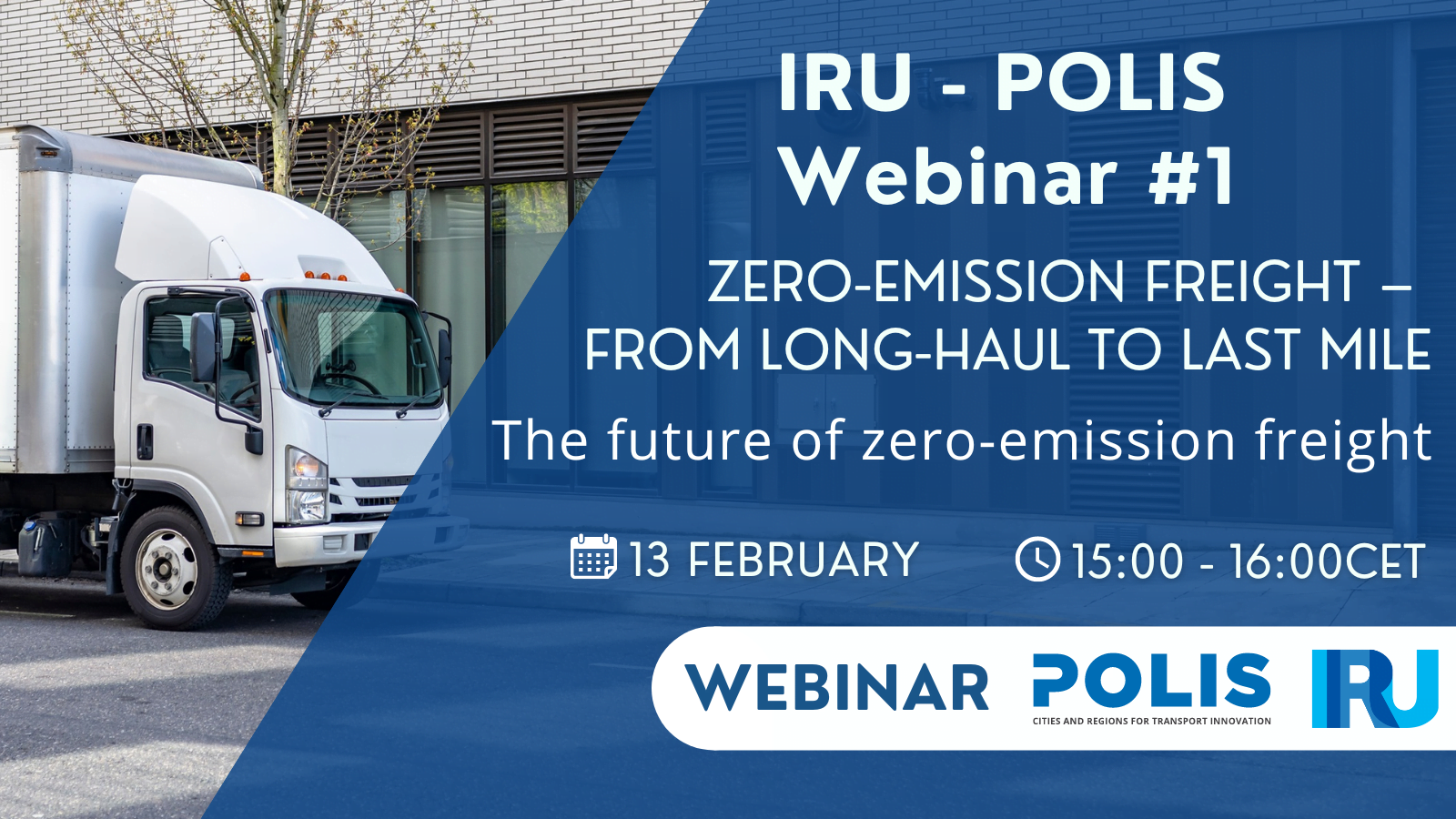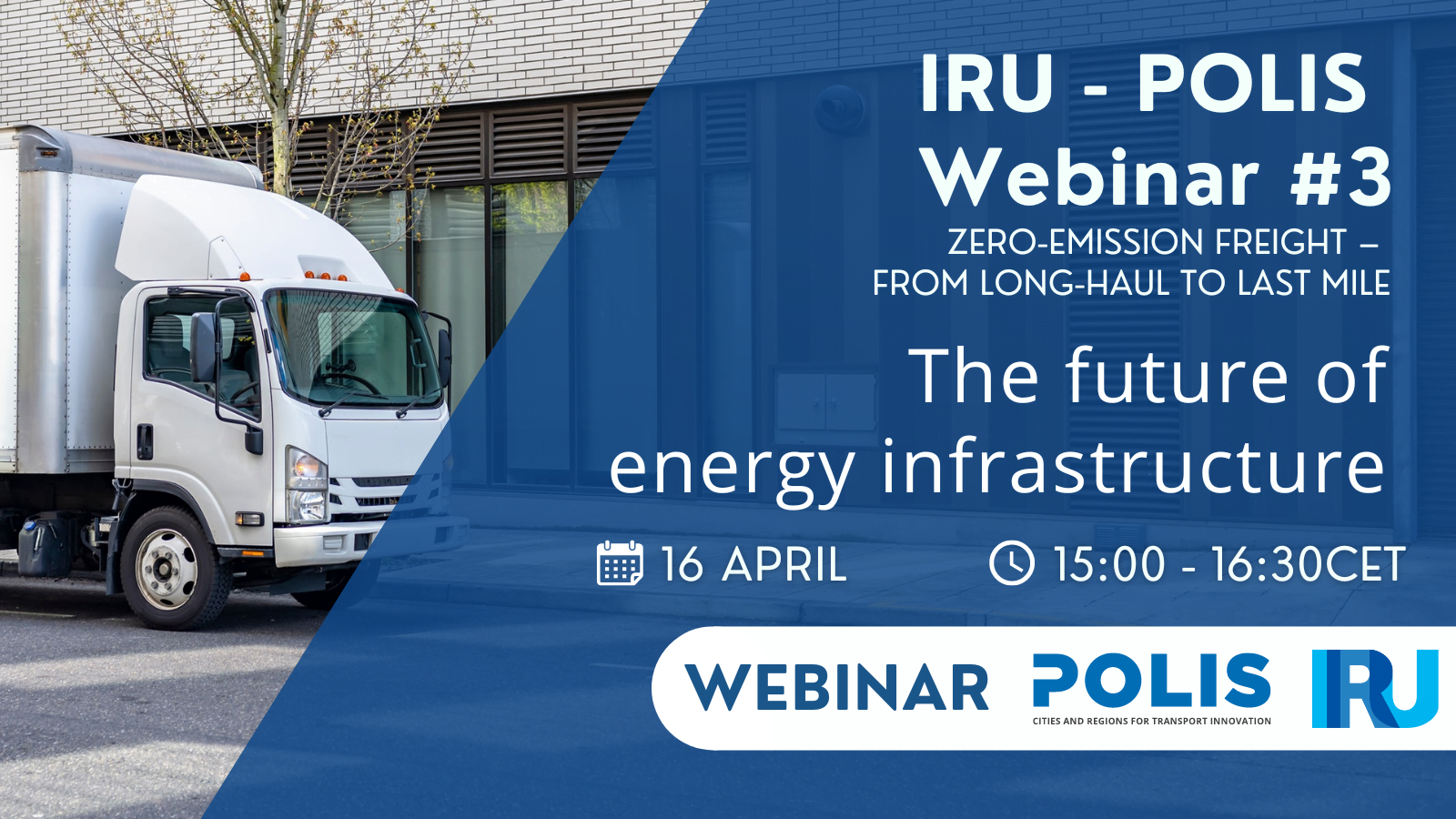First IRU-POLIS 'Zero-Emission Urban Freight Webinar' inspires over 100 stakeholders
The road freight transport industry and cities and regions share the vision and ambition to decarbonise road freight transport across Europe. However, there is a need to better coordinate and align on the way forward to achieve the ambitious targets set at the European level.
Potential strategies and related challenges were discussed in the first joint IRU-POLIS webinar, which took place on 13 February 2024. The webinar brought together stakeholders from the industry, cities and regions together to exchange and raise awareness concerning the long and winding road towards a decarbonised road-freight industry. You can find the recording of the webinar here and at the bottom of this article. Furthermore, IRU and POLIS invite you to join the second and third webinars.
The webinar started with an introduction to the current emission issues and decarbonisation efforts of the heavy-duty freight sector by Ben Kraaijenhagen, project manager of ZEFES and independent consultant. Kraaijenhagen pointed out that the annual global CO2 emissions from road freight transport amount to 2.1 gigatons, which is more than the entire emissions of India (based on the year 2020). According to Kraaijenhagen, several solutions exist, such as the reduction of the total freight movement, optimisation of logistics assets (trucks), or the improvement of energy efficiency of logistics operations.
Since the opportunities for a modal shift are limited and the road freight transport sector is complex, one needs to have an ambitious strategy to reach the EU climate targets. One piece of the puzzle is EU-funded projects which test zero-emission freight vehicles (e.g. ZEFES and NextETRUCK, which will also be presented in the next IRU-POLIS webinars).
The roundtable discussion, which was moderated by Holger Loewendorf (IRU), offered insights into the topic of zero-emission freight from four panellists, representing cities, regions, and the freight industry, who highlighted the current challenges and efforts of decarbonising the road freight industry:
Emmanuel Arnaud, XPO Logistics’ Senior Vice President of Operations for Europe:
“Decarbonisation is one of our long-standing sustainability and corporate social responsibility commitments. This is exemplified by our goal to cut our total emissions by 25% by 2030. A journey we’ve pioneered with long-term strategies to invest in zero-emission vehicles (such as the recent acquisition of 165 EVs) and the development of our innovative LESS® (Low Emissions Sustainable Solutions) programme.”
LESS uses alternative fuels and vehicles, such as hydrogenated vegetable oil, gas and electric vehicles, as well as multimodal transport solutions that combine road, rail, short sea shipping and river transport, including barges to transport goods to Paris via the Seine River.
As such, XPO enables its customers to make significant progress in decarbonising their supply chains. The company's vision is to set and achieve ambitious decarbonisation targets for the road transport sector, opting for a collaborative approach every step of the way. Working with all stakeholders, XPO, a leading provider of innovative and sustainable end-to-end logistics solutions across Europe with a fleet of over 20,000 vehicles is paving the way for a greener and more sustainable future.
Marc Billiet, IRU’s Goods Transport Senior Adviser:
“There is too much emphasis on the overall goal of decarbonisation and not enough focus on solutions that are easiest to deploy and implement. Road transport companies should be encouraged to decarbonise their fleets with measures they currently have at their disposal and gradually improve their efforts.”
“Decarbonisation should become more accessible for companies of all sizes. Road transport companies are interested in investing in decarbonisation, including in vehicles and operations, but their efforts must be feasible and affordable. Many businesses have made concrete commitments, but they are often not sufficiently recognised. More awareness should be raised about available opportunities for road goods transport companies. The development and market availability of battery-electric technology for commercial vehicles should also be improved,” he added.
Bart Dumoulin, Project Manager at Bond Beter Leefmilieu Flanders:
The environmental NGO Bond Beter Leefmilieu assessed the different stakeholders, which contribute to urban pollution and identified the road freight sector as a significant factor. According to Dumoulin, its impact is often underestimated as urban freight is responsible for about 25% of CO2 emissions and 50% of nitrogen and particulate matter in Flanders. The union ‘Beter Leefmilieu’ is convinced that three main steps need to be taken on the road towards decarbonising urban freight:
- Reducing the overall trips of freight vehicles
- Shifting towards environmentally-friendly freight solutions like cargo bikes
- Shifting towards zero-emission vehicles
Furthermore, Flemish cities, federations, NGOs and other societal groups were engaged in a dialogue to discuss several goals for road freight emissions. This will most likely include zero emission zones for freight in the near future, as well as a legal framework to promote emission-free city logistics and new rules on electric van sales from 2027. A clear roadmap to phase out freight vehicles with internal combustion engines (ICE) is also planned.
Raffaele Vergnani, Project Manager and Urban Freight Cluster Lead at POLIS Network:
Freight is critical to transport planning and the reduction of emissions in cities. For this reason, road freight decarbonisation and urban freight-related challenges are high on our agenda. POLIS is encouraging cities and regions to start a path and process to address these challenges, share best practices, and enhance collaboration with companies, prioritising innovative solutions leading to more efficient and clean deliveries. Local authorities play a pivotal role in promoting innovation and should focus on:
- urban freight logistics electrification
- transition to more lightweight transportation vehicles
- digitalisation of procedures – instantaneous and dynamic information networks
- collaborative and shared urban solutions.
Several innovative measures are being tested in specific pilots by POLIS’ members, where logistics providers, OEMs and cities are cooperating to test zero-emission freight vehicles in real-world scenarios, such as urban consolidation centres, parcel lockers and (smaller) zero-emission freight vehicles, digital tools to better understand and assess incoming and outcoming the freight flows within the urban environment.
Webinar recording:


